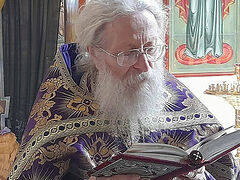The Tenth Week after Pentecost, Matthew 17: 14–23.
The next day (after the ascent of the Savior to Mount Tabor and the Transfiguration), when Jesus Christ, along with Peter, James, and John, descended from the mountain and came to the other disciples, the Lord saw a large crowd around them and scribes arguing with them (Mark 9:14).
At that very moment, everyone noticed Jesus. His appearance, His extraordinary majesty, and His radiant gaze filled the hearts of those around with a sense of reverence. The entire crowd was amazed, and, running up to Him, they greeted Him (Mark 9:15).
What question ye with them? (Mark 9:16), He calmly asked the scribes.
The scribes were too ashamed to admit their questions, and the disciples of Jesus were aware of their own lack of faith, failure, and inability, so they did not dare to answer.
Then, a man from the crowd approached Jesus, and kneeling before Him, cried out: "Lord, have mercy on my son; I beseech Thee to look upon him; he is my only child; he is grievously vexed with a spirit, and suffers greatly, often falling into the fire and into the water. A spirit takes hold of him, throws him down, and he suddenly cries out, foams at the mouth, gnashes with his teeth, and becomes rigid, and the spirit scarcely departs from him, having torn him. I brought him to Thy disciples, but they could not cure him” (see Matthew 17:15–16; Luke 9:38; Mark 9:17–18).
The man had brought his unfortunate son to the disciples to cast out the evil spirit, but their failure only provoked ridicule from the scribes.
O faithless and perverse generation, Jesus answered. How long shall I be with you? How long shall I suffer you? (Matthew 17:17). Bring him unto Me, the Savior continued. And they brought him to Him. When he was still approaching, and as soon as the demon-possessed saw the Lord, the spirit convulsed him and he fell to the ground, wallowing and foaming (cf. Mark 9:20; Luke 9:42).
In redirecting the accusation away from the disciples, Christ’s words, “O faithless and perverse generation,” were an indictment of the man who asked, but to avoid upsetting him, He addressed all the Jews, many of whom had taken offense and started thinking ill of the disciples. Not being content with accusations, the Lord said, “Bring him unto Me,” thus inspiring hope and confidence in the father that his son would be delivered from the demon. If the Lord delays the healing and allows the suffering to continue, it is not for show, but for his father—to stir and strengthen his wavering faith.
How long is it ago since this came unto him? (Mark 9:21), Jesus asked the father.
Of a child, the father replied, and oftentimes it hath cast him into the fire, and into the waters, to destroy him; but if Thou canst do anything, have compassion on us, and help us.
If thou canst believe, Jesus replied to him, as if returning his words back to him, all things are possible to him that believeth (Mark 9:22–23).
“With these words,” Christ implies, “I have such power that I can make others into miracle workers; and so, when you believe as you ought, you yourself can heal this one and many others.”
Then the desperate father cried out with tears, as many who lack faith and are troubled by doubt cry out: Lord, I believe; help Thou mine unbelief (Mark 9:24).
During this brief conversation, the crowd around the Savior grew larger and larger.
Jesus, seeing the crowd gathering, rebuked the unclean spirit, saying to it: “Thou dumb and deaf spirit, I charge thee, come out of him, and enter no more into him” (cf. Mark 9:25).
After this command, there came a wild cry, and the demon, having greatly convulsed him, came out of him; and he (the possessed) was as one dead, insomuch that many said, “He is dead.” But Jesus took him by the hand, lifted him up, and healed the boy, and delivered him to his father. And they were all amazed at the mighty power of God (cf. Mark 9:25–27).
The authority to cast out demons was given by the Lord to His disciples first of all, and even those who were not among the chosen used His name effectively for this purpose. Therefore, naturally, as soon as Jesus entered the house, the disciples asked Him privately: Why could not we cast him out? Afraid that they might have lost the grace given to them. And Jesus said to them: Because of your unbelief; for verily I say unto you, If ye have faith as a grain of mustard seed, ye shall say unto this mountain, ‘Remove hence to yonder place,’ and it shall remove; and nothing shall be impossible unto you. Howbeit this kind goeth not out but by prayer and fasting (Matthew 17:20–21).
To be continued…




